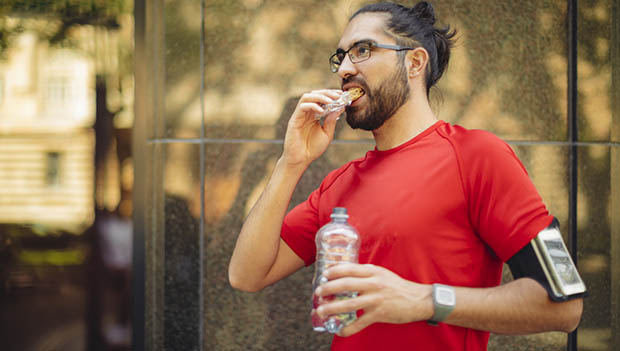
You've seen the gels and chews on the shelves of your local running store. Maybe you've stared down a wall of energy drinks at the supermarket. Whether you've only dabbled in sports nutrition or have a go-to strategy, you likely have some questions. Which runs always require fuel? And how much? If you're ready to take your endurance training to the next level, proper fueling is key. We have the low down on how to keep your energy high.
According to a position paper published by the American College of Sports Medicine, when it comes to exercise nutrition, "Athletes should be well hydrated before exercise and drink enough fluid during and after exercise to balance fluid losses. Sports beverages containing carbohydrates and electrolytes may be consumed before, during, and after exercise to help maintain blood glucose concentration, provide fuel for muscles and decrease risk of dehydration and hyponatremia."
Unfortunately, the guidelines on how much, when and what to consume are a bit murky. This is due, in part, to the individual nature of digestive systems. What works well for one runner may cause someone else serious GI distress. Keeping that in mind, there are still some general rules to follow. But as with most things, it may take a bit of trial and error to figure out what works best for you.
Before you run: If you begin a workout well fueled, you'll feel better and you may not even need mid-run nutrition. Stay hydrated by sipping plain water throughout the day. An hour or two before you plan to run, consume an easily digestible snack rich in carbohydrates. Avoid protein and fats, as they can take longer to digest. An example might be a piece of toast or an English muffin with jam. If you have less than an hour before you exercise, choose something small like a banana or a handful of dry cereal.
Easy runs of an hour or less: For exercise less than 60 minutes, plain water or an electrolyte-enhanced drink (e.g. NUUN) should do the trick. Follow the tips above to begin your workout well fueled.
Easy runs of 1 to 2 hours: Once you begin running over 60 minutes, you will likely need a bit of fuel to maintain energy. Focus on carbohydrates as they can be transformed into glucose by the body. Glucose is a form of sugar that your brain and muscles use to function. Most of the body's glucose is stored in the liver and muscles as glycogen, and once you begin to deplete your supply (usually after about an hour or so of exercise), you'll need to use on-the-run nutrition to keep energy levels steady. After 45 to 60 minutes of running, consume approximately 100 calories of an easily digestible carbohydrate—sports drink, a gel or even a few pieces of candy. Sip water as needed, based on the weather and your personal hydration needs.
Runs of 2-plus hours: Once your workout exceeds 2 hours (think: long runs during marathon training), you'll need to fuel even more. Starting at the 30 to 45 minute mark, begin consuming about 100 calories or 20 grams of carbohydrates. Repeat every 45 minutes for the duration of the run. If you choose gels or chews, try to wash them down with a few sips of water.
Hard efforts between 1 to 2 hours: Tough workouts and races lasting between 60 to 120 minutes are often in a grey area when it comes to on-the-run nutrition. Many runners need fuel for efforts over 90 minutes (such as a half-marathon), but you may be able to skip the gels for efforts closer to an hour (a 10K to 15K, for example). Try to practice consuming fuel before race day—hard efforts draw circulation away from the intestines, making food harder to digest.
Hard efforts over 2 hours: For endurance events like the marathon, an ultra or a triathlon, practice what you will eat throughout your training. These intense events will require more carbohydrates and fluid, so you may find yourself fueling earlier and more often. A rough rule of thumb is 100 to 200 calories or 20 to 50 grams of carbohydrate per hour (depending on your fitness level, body composition, and other similar factors). You can get this through gels, chews or sports drinks—whatever your body seems to tolerate best.
READ THIS NEXT: Running Nutrition for Training Versus Racing


